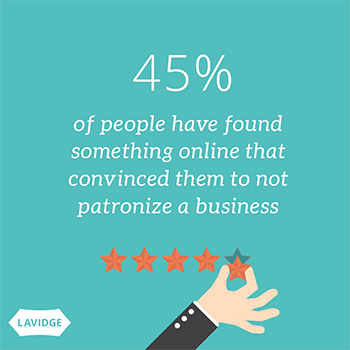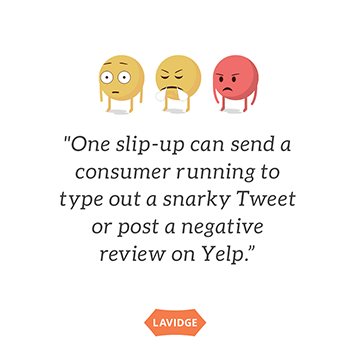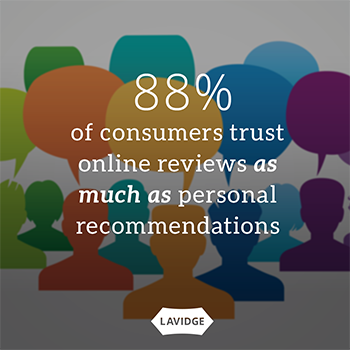Need fresh thinking? Help is a few keystrokes away.
Managing Your Online Reputation
 If you don’t believe your retail services company’s digital footprint is important, then consider these three eye-opening stats:
If you don’t believe your retail services company’s digital footprint is important, then consider these three eye-opening stats:
- 85% of consumers use the internet to find local businesses.
- 90% of your customers are influenced by online reviews.*
- 45% of people say they have found something online that convinced them to not patronize a business.
Unless you’ve been hiding out on the remote island of Tristan de Cunha, you know that any company’s online reputation is crucial to attracting new customers and keeping existing ones. This is especially true for retail services businesses such as fitness clubs, spas and salons. They are constantly being judged by their customers. One slip-up can send a consumer running to type out a snarky Tweet or post a negative review on Yelp.
That’s why watching your online reputation (or hiring a retail agency to do so on your behalf) is no longer optional. Your digital strategy must include steps to monitor, manage and address what’s being said about you online. Here’s where to start.
Do this first
The most important thing you can do to manage your online reputation is to be excellent. If your fitness club is dirty, your members will post the evidence on Facebook. If a customer gets a subpar massage at your spa, they’ll give you a terrible one-star review complete with details about their poor experience. If someone isn’t happy with their new hair style, they’ll tell all their Twitter friends.
While there are some malicious individuals among us, most people are fair. That means you can control what they say by being totally buttoned up. Provide excellent customer service. Offer outstanding retail health, beauty and grooming products. Ensure your staff are well trained. Present a welcoming and spotless facility.
 Look in the mirror
Look in the mirror
The next step is to pretend you’re a potential service client or retail customer. Go online and search for your business by name. Do you find anything negative on the first page of search results? Then search for your business by category, and in a way that potential customers might look for your services. If you’re a hair stylist, type in “Phoenix hair stylist” or “local hair salon,” “best hair salons in town” or "hair salon near me."
These searches will help you discover two things. First, you are likely to find some negative reviews that require your attention. And second, your investigation might reveal that you’re not showing up at all. If you can’t be found online, you don’t exist.
By the way, you can pretty much ignore anything that’s not on the first page of a Google or Bing search. More than 90% of us never go to page two. That's why being diligent with ongoing search engine optimization efforts is also important in managing your online presence in addition to active social media management and listening. When your own pages rank highest, you can ensure that good things about you will rise to the top—including customer testimonials you solicit and publish right on your website.
Deal with poor reviews
Whether we like it or not, online reviews are persuasive. Strangely, consumers trust reviews even though they don’t know the people who wrote them. Here’s the kicker: 88% of consumers trust online reviews as much as personal recommendations.°
It doesn’t take many poor reviews to affect your business—22% of us won’t buy a product or service from a company on the basis of just one poor review. Another 22% will seek an alternative company after seeing two negative comments.
 Sooner or later, you’re bound to have a dissatisfied customer, and they might leave you a poor review. If that happens, you should reply as soon as possible, and do so in a positive way that 1) thanks the consumer for their honesty and helpfulness; 2) explains what action you’re taking right now to fix the problem; and 3) invites the customer to give your business a second chance.
Sooner or later, you’re bound to have a dissatisfied customer, and they might leave you a poor review. If that happens, you should reply as soon as possible, and do so in a positive way that 1) thanks the consumer for their honesty and helpfulness; 2) explains what action you’re taking right now to fix the problem; and 3) invites the customer to give your business a second chance.
If you leave poor reviews unaddressed, potential consumers may rightly assume that you don’t care and, worse, that the review is an accurate reflection of the problem. But when you publicly address a negative review, you can change perceptions. Many people will revisit the reviews they wrote, thanking the company and rewriting/correcting the review, even increasing their original star ranking.
Get great reviews
The secret to obtaining excellent reviews is to actually ask for them. It’s as simple as that. The odds of getting positive reviews multiply exponentially when you request them on a consistent basis and make it easy for customers to review your beauty, health and wellness product, or retail service. You can even reach out to a micro- or well-known social media influencer to see if they will say nice things about your company, retail services or employees.
There are many online tools that help automate this process. A service such as Grade.us will send satisfaction surveys to your customers and encourage them to provide feedback in a review. You’ll also be alerted to poor reviews and be able to quickly respond.
Get listed
Did you find any unpleasant surprises when you conducted an online search for your company? If so, you can take steps to push them to page two of Google or Bing results, which means they’ll likely never be seen again.
This can be accomplished by making sure that negative elements rank lower than positive ones—such as great reviews, directory listings, and your own social media. Tools such as Yext.com can help ensure your various listings and address information are optimized and available online, and it can facilitate reviews, as well. It’s also a good idea that your business takes advantage of the myriad free platforms that can promote your company, such as Facebook, Google+, Twitter and more.
Final thoughts
Reputation management isn’t a one-time effort. All it takes is one bad review for you to lose business. Stay vigilant. Check your reviews every day. And look for your own business frequently so you can discover what your retail services customers are seeing.
Need help?
LAVIDGE, an Arizona retail social media agency, can develop a customized strategy for your brand's online reputation management.
To learn more, give our full-service digital agency a call at 480.998.2600 or send email to [email protected].
How important are online reviews?
Here’s some compelling evidence that underscores the importance of managing your company’s online reviews.
-
54.7% of consumers believe that online reviews are fairly, very or absolutely an important part of their decision-making process.
-
Businesses risk losing as many as 22% of customers when just one negative article is found by users considering buying their product.
-
If you have four or more negative articles about your company or product appearing in Google search results, you’ll likely lose 70% of potential customers.
-
Here’s where people go to learn about a company before buying products or services from them:
-
20% Google Reviews
-
10.9% Amazon
-
5.2% Wikipedia
-
4.2% Yelp
-
3.2% Trip Advisor
-
64.2% None of the above
(Source: Moz.com)
-
* Dimensional Research
° Search Engine Land
Southwest Retail Services Marketing Report

This article is a brief abstract of our exclusive and authoritative study that takes the guesswork out of retail services advertising and marketing. Rather than speculating about what will drive consumers to action, we've asked them.


